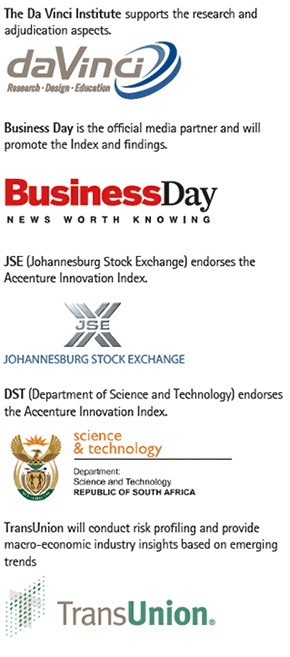THE small guy with a big idea faces many hurdles on the road to success, but one thing the Accenture Innovation Index and Awards has shown is that it is possible to make it big.
During a lively panel discussion at the awards in October, Science and Technology Minister Derek Hanekom said it was wrong to think government needs to give a grant or subsidy for anything to happen.
Accenture CEO William Mzimba called for enterprises to "live and breathe" innovation to strengthen the economy, and Discovery CEO Adrian Gore felt there was a serious need to "create space for new ideas". But Gore highlighted that there were serious skills challenges, including the need for better trained management. However, he agreed with the minister that a sustainable innovation culture cannot be built by relying on skills and grants.
While a number of government programmes do exist and some notable successes have been achieved, leading economists feel far more needs to be done at policy and public-private partnership level. One of the challenges to be overcome, they say, is the favourable policy treatment big business gets.
Stanlib’s chief economist, Kevin Lings, says there are many problems for small business in South Africa, but most agreements put in place by big business, big labour and government at the National Economic Development and Labour Council tend to favour established business.
"It is not conducive to small business development," he says.
The minimum wage per industry is one example of how policy can hurt small business. If someone wants to enter the market as a start-up, then they would be obliged to comply with the industry-wide agreement, even if this eats profits.
"From the beginning you are put off from entering industry, or you enter and flounder with rules and conditions," he says.
Mike Schussler from Economists.co.za says while a number of businesses are started in South Africa, it appears many of these are not by self-employed entrepreneurs. His research shows only 18% of companies are actually big enough to employ people who qualify to pay payroll taxes. He says while there are 2.2-million companies registered for tax, only 393,000 are big enough for employee’s tax (PAYE). "So based on this, less than one in five companies gets big," he says, adding that another major hurdle is the lack of infrastructure. "It is great to say beneficiation, but if there is no electricity, you can’t put new mines in certain sectors."
He says the slow pace of creating extra power capacity in South Africa means we may be three to four years away from implementing many of the local beneficiation plans.
"You could have the best idea in the world, but prices and electricity are not there." He adds that some towns now also have no water or restrictions on water, which is another major hindrance to business growth.
Lings would like to see a different set of rules for small business at infant stage. This approach would, however, need a special dispensation to apply for a period of time, with easier rules that enable the company to become established, which then fall away. It would mean ensuring entry level becomes the norm, but policy changes would include a more favourable tax regime for small business and assistance programmes.
As access to finance remains a major problem, the very model of basing this on the ability to quickly maximise profits would need to change. The current model requires a lot of security and assurances, and generally five years of trading statements. The banking sector is just not geared up in terms of its structure for small businesses.
"It is clear to me we need a venture capital market, which does development of a high risk nature," says Lings.
One way to get this going would be the private sector funding half and the public sector the other half, which would be pooled and housed in a fund run by the private sector with a mandate to promote start-up business. According to Lings it could be staffed by retired business people.
And when a business applies it won’t say they need a five-year track record or security via a mortgage. Instead the fund will assess entrepreneurial expertise.
"We have a huge number of businesses in the informal sector demonstrating every day what can be done — they trade in the most unusual circumstances that logistically should be difficult. We have entrepreneurial capacity, but not the ability to comply with forms and rules."
The real risk for such a fund would be a lot of money is at risk of loss, so "we need to say it’s a development fund, but if we lose money, so be it. You can’t impose restrictions that they can repossess your house. Then you never finance an entrepreneur," says Lings.
It will also be important for other entrepreneurs to assess these businesses.
"You are literally taking a chance," says Lings. "If it works out, the benefits to the country are enormous. I think it’s worth the risk if you pilot it. You don’t want hundreds of bills, but seed capital and do a trial project. Shut it down if it doesn’t work."
While there are many initiatives by government, they are not accessed, as government has struggled with its ability to promote its own programmes.
"Business is not aware of the programmes — they are completely underutilised. South Africa has the entrepreneurs, and they must feel a door has opened."
While Accenture has received plaudits for moving to tangibly improve innovation in South Africa by launching an Index and Award programme, there is a long road ahead. Economist from Adcorp, Loan Sharpe, says the number of people starting their own businesses has fallen from 250,000 in 2001 to 50,000 today — a drop of 80%. Yet the reality is 67% of all employment in South Africa happens in companies employing less than 50 people, while 50% of all employment happens in companies employing less than five.
"Employment is a small business phenomenon," he says.
But the number of active new businesses has gone from 2.4-million in 2006 to 1.9-million, a drop of 440,000.
JSE-listed companies only employ 1.4-million people, which is 9.9% of total employment.
Sharpe says government’s employment strategy is focused on big business, when small business is in fact the driver.
While there has been some government deregulation of the small business sector, he says this does not mean it is making it easier to register, as the tax burden is a problem, compliance with labour laws, competition from the informal sector, and bargaining council agreements that favour big employers continue to drive small businesses out of business.
"Government actions are often well intentioned, but the unintended consequences of legislation are never considered."
According to Sharpe, it should be mandatory to have a regulatory impact assessment on every law proposed in South Africa and he would support the establishment of an independent office whose sole job would be to do these.
"Laws and regulations are flying thick and fast, but there is no connection of consequences, especially unintended ones."
Lings is concerned about the highly concentrated business landscape, where only a few companies dominate an industry. But he says one way to even things out is via the internet and technology. "The gap disappears when you’re on the net."
But South Africa needs to actively promote access to the internet, as then it can promote small business and employment enormously, helping them get their product out to compete head-on with big business.
Certain technologies such as online shopping are not difficult to put up on a website, and costs are low. But, according to Lings, access and speed are "too low", and while the sector is growing it is not at a point where South Africa can compete with other countries.
In South Africa the single biggest problem is the unemployment of the youth. "We need to tell young people with capacity and capability there is a future, as opposed to thinking the only option is being employed by big business — that model is just not working," says Lings.
"We need to be willing to bet on our own population. When we get some successes and generate it we change culture and mind-set."
Schussler says South Africans are known to be innovative — local mining equipment was at one point exported all over world, for example. But his concern is "you often have to leave South Africa to become famous".
Says Schussler: "We have become good at implementing other peoples’ ideas."
He says while up to 300,000 companies can be registered a year, many don’t even make it past the registration phase.
"An idea always sounds great and may even get financing. But then it becomes difficult when you want to sell," he says. "In South Africa there is sometimes not enough self-belief."

A panel discussion at the awards dinner included journalist Jeremy Maggs, The Da Vinci Institute’s Prof Roy Marcus, Discovery CEO Adrian Gore, Accenture CEO William Mzimba and Science and Technology Minister Derek Hanekom.
THE small guy with a big idea faces many hurdles on the road to success, but one thing the Accenture Innovation Index and Awards has shown is that it is possible to make it big.
During a lively panel discussion at the awards in October, Science and Technology Minister Derek Hanekom said it was wrong to think government needs to give a grant or subsidy for anything to happen.
Accenture CEO William Mzimba called for enterprises to "live and breathe" innovation to strengthen the economy, and Discovery CEO Adrian Gore felt there was a serious need to "create space for new ideas". But Gore highlighted that there were serious skills challenges, including the need for better trained management. However, he agreed with the minister that a sustainable innovation culture cannot be built by relying on skills and grants.
While a number of government programmes do exist and some notable successes have been achieved, leading economists feel far more needs to be done at policy and public-private partnership level. One of the challenges to be overcome, they say, is the favourable policy treatment big business gets.
Stanlib’s chief economist, Kevin Lings, says there are many problems for small business in South Africa, but most agreements put in place by big business, big labour and government at the National Economic Development and Labour Council tend to favour established business.
"It is not conducive to small business development," he says.
The minimum wage per industry is one example of how policy can hurt small business. If someone wants to enter the market as a start-up, then they would be obliged to comply with the industry-wide agreement, even if this eats profits.
"From the beginning you are put off from entering industry, or you enter and flounder with rules and conditions," he says.
Mike Schussler from Economists.co.za says while a number of businesses are started in South Africa, it appears many of these are not by self-employed entrepreneurs. His research shows only 18% of companies are actually big enough to employ people who qualify to pay payroll taxes. He says while there are 2.2-million companies registered for tax, only 393,000 are big enough for employee’s tax (PAYE). "So based on this, less than one in five companies gets big," he says, adding that another major hurdle is the lack of infrastructure. "It is great to say beneficiation, but if there is no electricity, you can’t put new mines in certain sectors."
He says the slow pace of creating extra power capacity in South Africa means we may be three to four years away from implementing many of the local beneficiation plans.
"You could have the best idea in the world, but prices and electricity are not there." He adds that some towns now also have no water or restrictions on water, which is another major hindrance to business growth.
Lings would like to see a different set of rules for small business at infant stage. This approach would, however, need a special dispensation to apply for a period of time, with easier rules that enable the company to become established, which then fall away. It would mean ensuring entry level becomes the norm, but policy changes would include a more favourable tax regime for small business and assistance programmes.
As access to finance remains a major problem, the very model of basing this on the ability to quickly maximise profits would need to change. The current model requires a lot of security and assurances, and generally five years of trading statements. The banking sector is just not geared up in terms of its structure for small businesses.
"It is clear to me we need a venture capital market, which does development of a high risk nature," says Lings.
One way to get this going would be the private sector funding half and the public sector the other half, which would be pooled and housed in a fund run by the private sector with a mandate to promote start-up business. According to Lings it could be staffed by retired business people.
And when a business applies it won’t say they need a five-year track record or security via a mortgage. Instead the fund will assess entrepreneurial expertise.
"We have a huge number of businesses in the informal sector demonstrating every day what can be done — they trade in the most unusual circumstances that logistically should be difficult. We have entrepreneurial capacity, but not the ability to comply with forms and rules."
The real risk for such a fund would be a lot of money is at risk of loss, so "we need to say it’s a development fund, but if we lose money, so be it. You can’t impose restrictions that they can repossess your house. Then you never finance an entrepreneur," says Lings.
It will also be important for other entrepreneurs to assess these businesses.
"You are literally taking a chance," says Lings. "If it works out, the benefits to the country are enormous. I think it’s worth the risk if you pilot it. You don’t want hundreds of bills, but seed capital and do a trial project. Shut it down if it doesn’t work."
While there are many initiatives by government, they are not accessed, as government has struggled with its ability to promote its own programmes.
"Business is not aware of the programmes — they are completely underutilised. South Africa has the entrepreneurs, and they must feel a door has opened."
While Accenture has received plaudits for moving to tangibly improve innovation in South Africa by launching an Index and Award programme, there is a long road ahead. Economist from Adcorp, Loan Sharpe, says the number of people starting their own businesses has fallen from 250,000 in 2001 to 50,000 today — a drop of 80%. Yet the reality is 67% of all employment in South Africa happens in companies employing less than 50 people, while 50% of all employment happens in companies employing less than five.
"Employment is a small business phenomenon," he says.
But the number of active new businesses has gone from 2.4-million in 2006 to 1.9-million, a drop of 440,000.
JSE-listed companies only employ 1.4-million people, which is 9.9% of total employment.
Sharpe says government’s employment strategy is focused on big business, when small business is in fact the driver.
While there has been some government deregulation of the small business sector, he says this does not mean it is making it easier to register, as the tax burden is a problem, compliance with labour laws, competition from the informal sector, and bargaining council agreements that favour big employers continue to drive small businesses out of business.
"Government actions are often well intentioned, but the unintended consequences of legislation are never considered."
According to Sharpe, it should be mandatory to have a regulatory impact assessment on every law proposed in South Africa and he would support the establishment of an independent office whose sole job would be to do these.
"Laws and regulations are flying thick and fast, but there is no connection of consequences, especially unintended ones."
Lings is concerned about the highly concentrated business landscape, where only a few companies dominate an industry. But he says one way to even things out is via the internet and technology. "The gap disappears when you’re on the net."
But South Africa needs to actively promote access to the internet, as then it can promote small business and employment enormously, helping them get their product out to compete head-on with big business.
Certain technologies such as online shopping are not difficult to put up on a website, and costs are low. But, according to Lings, access and speed are "too low", and while the sector is growing it is not at a point where South Africa can compete with other countries.
In South Africa the single biggest problem is the unemployment of the youth. "We need to tell young people with capacity and capability there is a future, as opposed to thinking the only option is being employed by big business — that model is just not working," says Lings.
"We need to be willing to bet on our own population. When we get some successes and generate it we change culture and mind-set."
Schussler says South Africans are known to be innovative — local mining equipment was at one point exported all over world, for example. But his concern is "you often have to leave South Africa to become famous".
Says Schussler: "We have become good at implementing other peoples’ ideas."
He says while up to 300,000 companies can be registered a year, many don’t even make it past the registration phase.
"An idea always sounds great and may even get financing. But then it becomes difficult when you want to sell," he says. "In South Africa there is sometimes not enough self-belief."






















Change: -1.39%
Change: -1.63%
Change: -1.60%
Change: -1.60%
Change: -1.31%
Data supplied by Profile Data
Change: -0.39%
Change: -0.40%
Change: -1.39%
Change: 0.00%
Change: -0.40%
Data supplied by Profile Data
Change: 0.77%
Change: -0.33%
Change: 0.62%
Change: 0.96%
Change: 1.28%
Data supplied by Profile Data
Change: 0.76%
Change: 1.02%
Change: 0.13%
Change: 0.50%
Change: -0.68%
Data supplied by Profile Data